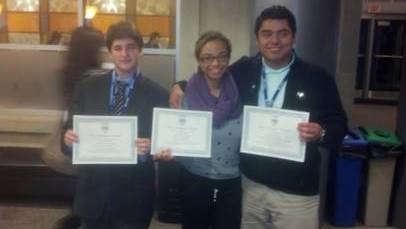During the 14th annual Model UN Conference, which was held at the University of Connecticut in Storrs Nov. 8-10, 2012, 27 students from the Academies @ Englewood braced against the chilly Connecticut wind in their professional attire.
The school was well represented, and it was evident in the fact that three students won the Best Delegate Award among the 300 students from over 20 different schools. The three students who won were senior Manuel Barrientos, junior Elizabeth Spenst and sophomore Jacob Kholodenko. The conference gave students the opportunity to meet with high school students from different backgrounds and learn about current world issues.
“As the future of this nation and world, we are responsible to know international affairs,” said senior Manuel Barrientos, winner of Best Delegate Award and currently an intern at the UN Headquarters in New York.
Nations all across the globe face social, political, economic and environmental issues, and oftentimes it is difficult to come to a consensus on how to solve these striking problems. However, students at the conference acted as delegates from UN-affiliated countries to debate and to eventually pass resolutions about the issues assigned to their committees.
Manuel represented the Palestinian Authority for Special Political and Decolonization (SPECPOL) at the Conference and learned that it is often small nations that take the initiative to help out while big nations are reluctant to do so in fear of losing power. Although he initially had trouble being recognized as a representative of an unofficial nation, he made his nation’s opinions heard. He also helped to pass a resolution when there was a “crisis” due to Syrian rebels and the Syrian government’s use of children soldiers. At Model UN conferences, mock crisis situations are simulated to add another level of problem-solving.
Elizabeth Spenst, who won the Best Delegate Award for the Girl-Up Committee, worked to resolve oppression of girls in her Committee. Sadly, she learned about the many problems girls face in developing nations.
“I was able to pass a resolution that would work towards ending child marriage in many countries,” she explained.
Jacob Kholodenko, who represented the United States in the United Nations Children’s Fund (UNICEF), got the opportunity to understand different views on child labor and the issues caused by the Arab Spring. Along with the learning experience, Jacob enjoyed the acapella performance and the delegate dance.
The freshmen, who made up a quarter of the students on the trip, shared the same excitement as the upperclassmen except with a tinge of nervousness.
“I felt intimidated at first, but it got better and I gained a lot of experience from it,” commented freshman Dae Won Lee who represented Japan for the United Nations Development Programme (UNDP).
Students and teachers alike were satisfied with the organization of the conference and all the resources it had to offer. They also enjoyed the two guest speakers: one who works with WITNESS to spread awareness about political events through the usage of videos and another who works to educate the U.S. Congress about the United Nations.
“The guest speakers were excellent,” commented John Cirilli, the co-advisor of the Model UN Club with Mindy Rochman.
“They made connections with real life, and showed the purposes of the UN and how it affects different facets of our lives.”
Although students enjoyed the conference overall, they felt that it would have been even more enjoyable had they been allowed to tour the UCONN campus instead of being confined to one building. Students also complained about the early curfews.
“The Model UN has a great academic purpose in terms of exposing students to different areas of the world and government. It helps to improve writing skills, and, most importantly, it gives students the opportunity to be exposed to people from different states and countries whose viewpoints can be enlightening,” Mr. Cirilli said.
He highly recommends underclassmen to join this after-school club to expand their world and help ours.



